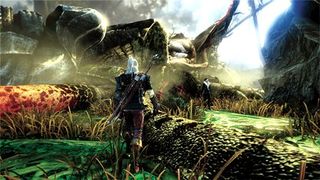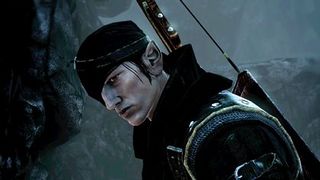The Witcher 2 gets more mature
The world gets bigger, the choices get harder, the sex gets classier
The Witcher was the sort of game that inspires devotion and love; not because it was perfect, but because it tried to go beyond the obvious. While it didn’t always succeed, the important thing was that it tried, and in today’s world of ultra-generic military shooters and pointy-haired RPGs, it’s more important than ever for games to offer an original, unique experience. With playing cards of naked women.
Forget about them in the second game, though. CD Projekt are tossing them out with the old bathwater and concentrating on making a properly mature game, but don’t think that that aspect of the game is completely wiped from history. Romance and sex are still very much a part of all things Temeria (the land The Witcher 2 is set in) but they’ll be handled in a subtler way than a short movie and a pornographic playing card. How deep this will go is unknown, but at least accusations of schoolboy attitudes towards sex will be easily dismissed from now on. But of course, there’s more to The Witcher than nude women.

As CD Projekt are a relatively small developer, the first game made use of a heavily modified version of BioWare’s Aurora engine, which held its own on the visuals front. It didn’t lend itself to producing the expansive areas that CD Projekt wanted, which is one of the reasons they decided to ditch that engine and create their own from scratch. This one will allow for much bigger environments to trot around in, with CD Projekt happily claiming that a single area from the first game would fit into one from the second many times over. Cities will now feel more like bustling metropolises, while vistas in the countryside will stretch out farther than a video card can render.
Time for a little refresher course on all things Witcher: in the first game, you took control of Geralt of Rivia, a master swordsman who has earned unnatural powers of agility and self-preservation through using body-altering mutagens. Decried by the community at large, Geralt and his fellow Witchers, bounty hunters hired to rid the world of monsters, are few in number. At the end of the game, regardless of what path you chose to follow (either supporting the racist Order of the Flaming Rose, the rebellious elves and dwarves, or remaining neutral) you saved King Foltest from being stabbed up by a mysterious assailant.
That’s where you would have left off in the first game and the second continues down the neutral path, with the land still wracked by factional strife. By the time the story starts, the Order has been almost defeated, while relations between the Scoia’tel (non-human rebels) and the authorities are frosty. However, the situation is more stable than it’s been for a while and Geralt is on his way to La Valette castle, the home of a baroness who is still resisting King Foltest’s attempts to restore order. As the story progresses, the significance of the assassin whom Geralt defeated at the end of the first game becomes clear.

This becomes the main thread of the story, a tale that takes Geralt to new areas of Temeria. There’ll be no revisits to locations seen in the first game, so forget about going back to Vizima to see what’s going down there. As you know, the new areas will be more than double the size of the old ones, and another exciting factoid is that they won’t be crippled by loading screens. They’ll all be loaded in once and you can flit between all the different areas of the city at your will, which also includes building interiors.
While you might not be returning to familiar locales, you will be meeting up with some old friends. Wily witch Triss Merrigold will be about, as will the bumbling bard Dandelion and Zoltan the dwarf. The rest of Temeria’s populace will be much more reactive to how you carry out your Witcher duties, but it’s not going to be a binary thing; it’s more about the general attitude you display in conversations. Obviously, the bigger decisions will have more of an effect on things and CD Projekt will be certain to make a big deal out of these game-changing events.
Sign up to the GamesRadar+ Newsletter
Weekly digests, tales from the communities you love, and more
That you could make decisions at an early point in the game that changed the way things happened much later, but not always in an obvious way, was one of the major selling points of the original. This time around, there’ll be more decisions and the consequences will run much deeper. Some places will be dramatically different depending on the choices you make earlier on.

Those choices will also be made more interesting for us Anglophiles by the mere fact our language is being used as the primary language in the game. While it might rightly annoy Polish speakers to see a game from their country made in English, the consolation for us is that we won’t be getting the substandard translation the original Witcher suffered from on release (and was corrected in the Enhanced Edition).
Most Popular


